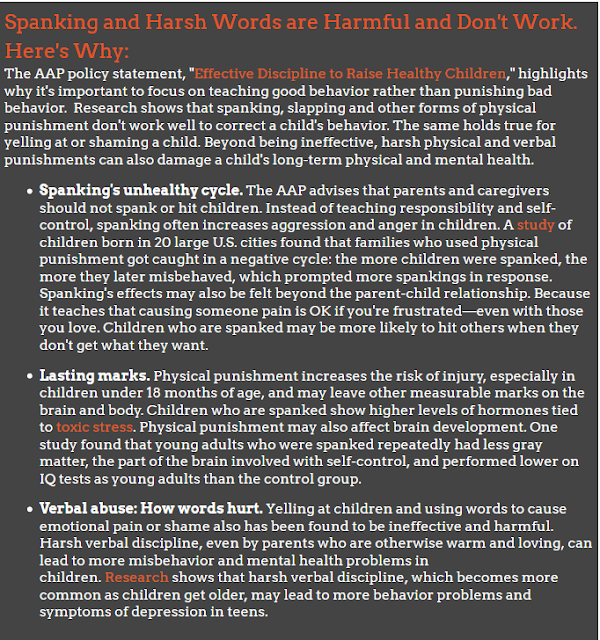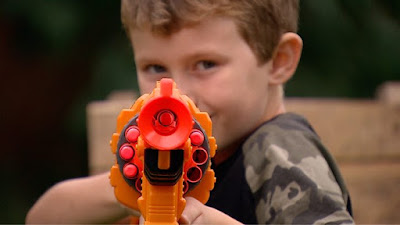Where is Your Focus?
According to the Arbinger
Company (1998), parents spend too much time asking, “What should I do, now that
something has gone wrong?” When they should be asking “How do I help things go
right?” (p. 2-3). To become effective parents, we must learn to focus our time
and energy on helping things go right, instead of reacting when things go wrong.
Arbinger (1998) has provided four questions to help parents achieve this shift
in focus.
1.
Am I Correcting My Children Without Teaching Them?
There
is an endless supply of advice and theories when it comes to disciplining
children. When choosing a method, it is important to understand “the
effectiveness of our correction of our children, whatever method we use, will
always depend on the effectiveness of our prior teaching of them.” (Arbinger,
1998, p. 3) If you want to spend less time disciplining, spend more time
teaching. If you want to become better at disciplining or have the ability to
correct with ease, spend more time teaching. This will help your child view
correction as learning and not punishment.
2.
What is the Quality of My Relationship with My Children?
Parenting
experts are starting to shift their focus and efforts from teaching discipline
techniques to control behavior to teaching the importance of a good parent-child
relationship. Realizing that “the quality of the relationship is more important
than specific techniques” (Goddard, Myers-Walls, & Lee, 2004 p.464).
Author and
parenting coach, Dr. Laura Markham (2017), gave the following explanation of
why connection or a good parent-child relationship is so vital when it comes to
teaching and correcting our children:
Connection is as essential to us parents as it is to
our children, because that's what makes parenting worth all the sacrifices.
That
connection is also the only reason children willingly follow our rules. Kids
who feel strongly connected to their parents want to cooperate, if they can.
They'll still act like kids, which means their emotions will sometimes overwhelm
their still-growing prefrontal cortex. But when they trust us to understand, to
be on their side, they're motivated to follow our lead when they can.
It
is important to remember that “no matter how much time we spend teaching our
children, they are unlikely to learn much from us if they don’t like us” (Arbinger,
1998, p. 4).
3.
What is the Quality of My Relationship with My Spouse?
Did
you know that the type of relationship you have with your children is
determined by the relationship you have with your spouse? According to Arbinger
(1998), “The marital relationship is the central relationship in the family; in
significant ways, it colors all others” (p. 5). How we feel towards and about
our spouse affects our ability to parent effectively. Feelings of frustration
towards a spouse can result in harsh corrections or leniency.
4.
How Pure in My “Way of Being?”
According
to Arbinger (1998), our way of being is:
who
we are as people. Who we are is a function of our deepest attitudes and
sensibilities towards others? It is the very way we see and experience the
people in our world. It is our way of being in the world with them. (p. 6)
How
do you view those around you? Are your spouse and children people with dreams
of their own, or merely extensions of yourself? Do your actions show
selflessness or selfishness? Effective parenting has more to do with how we are
than what we do.
These areas of concern
work together to form what Arbinger (1998) calls the Parenting Pyramid.
BYUI FAML 120
The
parenting pyramid teaches us:
1.
Although correction is part of parenthood, IT IS THE SMALLEST PART.
2.
The key to effective correction is effective teaching.
3.
The key to effective teaching is a good parent/child relationship.
4.
The key to a good parent/child relationship is a good husband/wife
relationship.
5.
The key to a good husband/wife relationship is our personal way of being.
Indeed, this quality affects every other aspect of the pyramid; that is why it
is the deepest foundation. (Arbinger, 1998, p. 6-7)
As you can see, the first
four levels of the pyramid answer the question, “How do I help things go
right?” Our personal way of being, our relationship with our spouse, our
relationship with our children, and teaching are the foundation of parenthood.
Without these elements in place, our attempt to answer the question, “What should
I do, now that something has gone wrong?” will prove to be useless. Correction
is not a stand-alone component of parenthood. Its effectiveness is dependent on
our effectiveness in all other levels of the pyramid.
When you find yourself
failing in one level or area of the pyramid, look to the level that lies
directly below it. For example, if you feel your correction techniques aren’t
working, take a step back and strengthen your teaching game. If you feel like
your teaching is falling on deaf ears, take a step back and work on the
personal relationship you have with your child. If you are struggling to build
a good relationship with your child, take a close look at your relationship
with your spouse and make any needed adjustments there. If your relationship
with your spouse is lacking, take a look at your personal way of being and how
you view and treat others.
Focusing our efforts on
making things go right, helps us avoid problems. But what do we do if our
attempts at prevention fail and we find ourselves in a situation that requires
immediate and drastic correction? “Begin working on the three deepest levels of
the pyramid immediately and simultaneously.” Resist the urge to spend all your
energy on correcting and teaching, instead focus your efforts on rebuilding the
relationship and show affection.
References:
BYUI
FAML120. (n.d.). Parenting Pyramid. Retrieved December 14, 2019, from:
Goddard,
Harold & Myers-Walls, Judith & Lee, Thomas. (2009). Parenting: Have We
Arrived?
Or
Do We Continue the Journey?. Family and Consumer Sciences Research Journal. 33.
457 - 474. 10.1177/1077727X04266689. Retrieved December 14, 2019, from https://onlinelibrary.wiley.com/doi/pdf/10.1177/1077727X04266689
Markham, L. (2017, June 27). 10
Habits to Strengthen a Parent-Child Relationship Retrieved
The
Arbinger Company. (1998). The Parenting Pyramid. Retrieved from:



Comments
Post a Comment